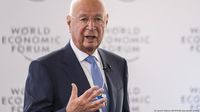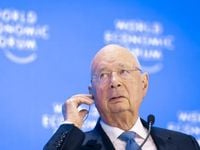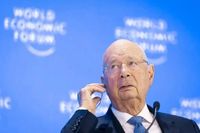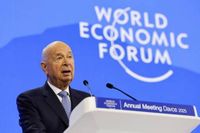Klaus Schwab, the founder and long-time chairman of the World Economic Forum (WEF), has announced his immediate resignation from his position as chairman of the board of trustees. This unexpected decision was made public on April 21, 2025, through an official communiqué released by the WEF.
At 88 years old, Schwab cited his age as a significant factor in his decision to step down. In his statement, he remarked, "After my recent statement and as I enter my 88th year of life, I have decided to step down as chairman and member of the board of trustees with an imminent effect of the decision." This announcement marks the end of an era for the WEF, which Schwab founded in 1971.
The board of trustees accepted Schwab's resignation during an extraordinary meeting held on April 20, 2025. Following this development, Peter Brabeck-Letmathe, who served as the vice chairman, was unanimously appointed as the interim chairman. The board also established a search committee tasked with finding a permanent successor for Schwab.
Schwab's tenure at the helm of the WEF has been marked by significant contributions to global dialogue on economic issues, but his departure comes amid swirling controversy. Reports have surfaced suggesting that his resignation may be linked to allegations of discrimination and harassment within the organization. According to an article by the Wall Street Journal, Schwab and other WEF leaders faced accusations of racism, illegal dismissals, and sexual harassment, which the organization has denied, stating that the article "inaccurately portrays the Davos Forum, its culture and colleagues, including the founder."
The WEF has been a pivotal platform for global leaders to discuss pressing economic and social issues, and Schwab's leadership has been instrumental in shaping its direction over the decades. His decision to resign is seen as a crucial moment for the organization as it seeks to navigate the challenges ahead.
In the wake of Schwab's announcement, several reactions have emerged from various stakeholders within the global community. Many have praised Schwab for his visionary leadership and the groundwork he laid for the WEF, while others have raised concerns about the implications of his departure amid ongoing controversies.
As the WEF prepares for a future without its founder, the interim leadership of Peter Brabeck-Letmathe will be critical in steering the organization through this transitional phase. Brabeck-Letmathe, who has been with the WEF in various capacities, will likely focus on maintaining stability and addressing the pressing issues that have arisen in recent months.
Schwab's resignation is a reminder of the complexities faced by organizations that operate at the intersection of business, politics, and society. His legacy will undoubtedly influence the WEF's future direction and the broader discourse on global economic governance.
Looking ahead, the newly formed search committee will play a crucial role in selecting Schwab's successor, a decision that will shape the WEF's leadership and strategic priorities for years to come. The committee's process will be closely watched by members of the international community, as the next chairman will need to navigate the challenges of a rapidly changing global landscape.
In summary, Klaus Schwab's resignation from the World Economic Forum marks a significant turning point for the organization he founded over five decades ago. As the WEF embarks on this new chapter, all eyes will be on how it adapts to the evolving challenges of global leadership and governance.








